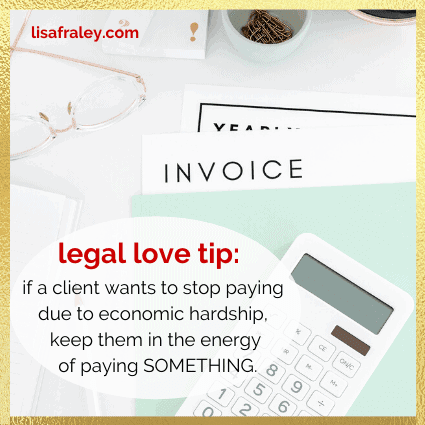[Free Legal Love Series] What to say if a client can’t pay
I know this is a difficult time for everyone on the financial front. Your clients may be concerned about how they are going to pay you. Some may want to stop paying you altogether. This can feel scary.
What should you do if a client says they can’t pay you?
All month I’m sharing FREE LEGAL LOVE TIPS about how to protect your money and yourself in my e-newsletters, blog posts and social media – like when people tell you they can’t pay, ask for refunds, or ghost you altogether. (Follow me on social media on Facebook and on Instagram.)
For example:
Let’s say you’re working with a client 1-on-1 and you have a signed Client Agreement. Your client emails you out of the blue and says: “My partner just lost their job and I can’t make my monthly payments. I can’t afford it right now.”
What can you do if your client wants to stop paying you due to economic hardship?
Here’s your Legal Love Tip:
Whatever you want to do when a client tells you they can’t pay is up to you. There’s no right or wrong answer. If you have a signed contract, you have the right to hold them to it.
However, if the client truly doesn’t have the income right now, I believe that it’s better to try to keep them in the energy of paying SOME amount each month rather than fighting a losing battle. (Even if you took them to arbitration and you won, they still may not have the income to pay you.)
That’s why I always want to try to help you help your clients stay in the energy of paying SOME amount of money to you each month – rather than not pay you anything.
Why? Because it’s MUCH easier to keep a client paying you even a reduced amount than to have them stop paying you completely and then try to charge them later.
Energetically, you want the energy to be flowing around them continuing to make payments – and not have that energy STOP.
If a client wants to stop paying you, my two favorite recommendations are to:
1.Change your payment plan to reduce the cost of the monthly payments.
Instead of a client paying you a higher amount each month, change it to a lower amount with a longer, extended payment plan.
You could offer that they make payments in 1/2 the amount as usual. Or you can even reduce payments to as little as $25/month or $50/month for x months to keep them in the energy of paying you.
For example, if a client is supposed to pay $200/month for 6 more months under the contract, have them pay $50/month for 24 months and tell them they can always increase their payments when they’re able and ready to do so.
You might think – “What? Extend it to 24 months! That’s extending their payment plan forever, Lisa!!!” Yes, it may feel like forever, you’re right. But wouldn’t you prefer that they pay you SOME money rather than not paying you at all?
What’s important is to keep them in the energy of paying you SOME amount of money. It’s much harder to collect when people stop paying altogether.
Several years ago, I myself had a situation with a client who lost her job and I offered to shift her payment plan for her. She agreed to make $25 monthly payments for 2 years and she’s still making those payments today. She’s never missed one.
If you choose this option, be sure to write out your changed payment plan and have the client agree to it in WRITING – not over the phone or Zoom. Using email is fine. Make sure the client confirms the new payment plan in writing too.
2.You can put payments “on hold” for 3 months.
Another option is to put payments on hold for x months. If a client really needs to pause their payments, you can put payments on hold – and also choose to put your services on hold if you wish – until they can make payments again.
For example, you can propose that no payments are due for the next 3 or 6 months and then pick up with regular payments after that. (You can choose however many months you want.)
You can decide whether to continue providing your services during this time or you can put your services on hold until payments resume. It’s your choice completely.
If you choose this option, be sure to propose it in writing – using email is fine. Make sure the client agrees in writing too – not over phone or Zoom.
I know these are trying times, but now you have 2 options to consider and you can feel confident and empowered if a client says they can’t pay. You can propose options for them to keep them in the energy of paying you and keeping at least SOME money flowing into your bank account.
If you have questions about payments or need help, feel free to reach out to me at clientlove@lisafraley.com. I’m here for you on the legal front each and every day.
Here’s to pivoting your payment plans, if needed, during this crazy time to help clients to keep their payments flowing to you!




